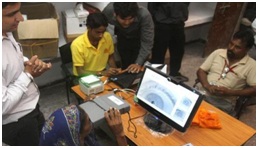India could make it mandatory for tech giants like Apple and Google to develop products linking to its biometrics-backed unique ID project. A failure to integrate with the Aadhaar scheme, which uses fingerprint and iris-scan authentication to access a range of public and private services, could impact on their presence in the country. An analyst said the government will react if US firms resist opening up their phones and operating systems to the Indian registration, encryption and security technology.
“There will be lots of pushing and shoving by the technology companies,” says Neeraj Aggarwal, Managing Director of the Boston Consulting Group in India. “It will be a battle of ecosystems, and companies will do their best to hold on to their own.”
India’s government had written to major tech players including Microsoft and Google seeking their feedback on solutions linking biometric authentication to the country’s unique ID system. However, none responded. The Government of India wants to use the tech giants’ proprietary software to allow matching of a user’s fingerprint or iris scan as captured in the mobile instrument with his or her biometrics as stored in the Aadhaar database.
Ajay Bhushan Pandey, who runs the Unique Identification Authority of India and convened the meeting, told Bloomberg that the industry representatives listened politely and were non-committal. But Pandey says he was frank about the government’s position, telling his visitors: “Go to your headquarters and work this out so that we can have Aadhaar-registered devices.”“We are doing 5 million authentications daily, and with Aadhaar-compliant devices that number will grow exponentially,” Pandey said to the financial news service. “There is a solid business case for technology companies to enable Aadhaar services.”








